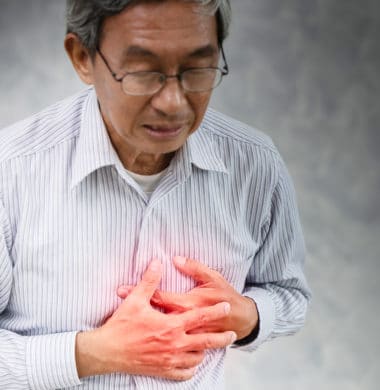What Do Heart Palpitations Feel Like?

Updated April 14, 2025
Heart palpitations are a general category for any time your heartbeats don’t feel healthy or normal. Although they can be scary, especially the first time you experience them, heart palpitations aren’t usually a cause for concern. If you experience them frequently or have a personal or family history of heart problems, you should contact a cardiologist.
What Heart Palpitations Feel Like
People describe heart palpitations in many ways. People often describe heart palpitations as a heartbeat that is:
- Pounding
- Fluttering
- Irregular
- Flip-flopping
- Beating too fast
- Skipping beats
- Having extra beats
In addition to feeling them in your chest, you might feel them in the throat or neck, sometimes even in the head.
What Are Heart Palpitations

The only way to tell the difference – and determine if any irregular heartbeat is a cause for concern – is with heart monitoring.
What Causes Heart Palpitations
There are many potential causes of heart palpitations. Most are not serious. Some of these you can control, while others are beyond your control. Possible causes of heart palpitations include:
- Heart conditions
- Low blood sugar
- Strenuous exercise
- Stress, anxiety, or panic attacks
- Stimulants, such as:
- Caffeine
- Nicotine
- Cocaine
- Amphetamines
- Pseudoephedrine
- Opioids like heroin and fentanyl
- Other medications
- Alcohol
- Illness and fever
- Hormone changes linked to menstruation, pregnancy, or menopause
- Thyroid hormone shortage or deficit
- Certain foods
Heart conditions associated with heart palpitations include heart arrhythmias like atrial fibrillation, atrial flutter, and some types of tachycardia. Structural heart problems and heart failure can also cause heart palpitations. When palpitations occur frequently, you should see a cardiologist to rule out these types of heart conditions.
When Should I Worry About Heart Palpitations?
In most situations, heart palpitations are harmless. This is generally the case when they’re caused by factors such as stress, caffeine, exercise or hormonal changes. It’s not always necessary to seek care for short, occasional heart palpitations. However, you should seek emergency care if you also experience:
- Pain or discomfort in your chest, arm, or jaw
- Shortness of breath
- Dizziness
- Fainting
You should consult with a cardiologist if:
- Heart palpitations occur frequently, last longer than usual, or involve more than six beats per minute
- Heart palpitations worsen
- You have a personal or family history of heart disease
- You have risk factors such as obesity, smoking or high cholesterol which might indicate that your heart palpitations are a sign of underlying heart problems
- You notice a sudden change in the frequency or intensity of heart palpitations
Your cardiologist may recommend monitoring to learn more about what’s causing your palpitations.
Lifestyle Changes Can Help Reduce or Prevent Heart Palpitations

Making dietary adjustments is one of the most impactful steps you can take to reduce heart palpitations:
- Eat a heart healthy diet containing plenty of fruits, vegetables, whole grains, lean proteins and healthy fats. Avoid processed foods, as well as foods containing excessive levels of salt, sugar and unhealthy fats.
- Identify trigger foods that tend to cause you to develop heart palpitations.
- If you’re diabetic, adjust your diet to more effectively manage your blood sugar levels.
Other lifestyle adjustments you can make include:
- Getting more sleep each night (aim for 7-9 hours a night)
- Limiting alcohol intake
- Reducing your consumption of stimulants such as caffeine
- Quitting smoking
It’s also a good idea to keep a journal of the activities, foods, medications and emotional states that typically trigger heart palpitations. This can help you understand which lifestyle adjustments will have the greatest impact on reducing the frequency of your palpitations.
A Comprehensive Cardiology Approach to Heart Palpitations in South Denver
If you have regular heart palpitations or a personal or family history of heart disease, it’s essential to talk to a cardiologist. However, you might also want to speak to a cardiologist simply for reassurance about the health of your heart.
At South Denver Cardiology, we take a comprehensive approach to all heart conditions, including heart palpitations. We want to help you figure out what’s causing your heart palpitations and recommend an appropriate treatment to eliminate them and head off any serious complications such as heart failure or stroke.
We start by taking the time to listen to you. We want to make sure we understand the situation where heart palpitations occurred and identify any potential heart palpitations causes. We take your experience seriously and will recommend heart monitoring when appropriate. Other times, we might recommend some of the lifestyle changes discussed above.
Please contact us today to request an appointment with South Denver Cardiology Associates. We serve patients in Denver, Littleton and the surrounding areas.
- Does Vaping Increase Your Risk of Heart Disease? - July 7, 2025
- Lifestyle Factors That Increase Your Risk of Heart Disease - May 26, 2025
- 6 Tips for Exercising Outdoors with a Heart Condition - May 19, 2025
Sign Up
As with any health concerns, your specific treatment program should be discussed thoroughly with your primary care physician as well as any specialists who may need to be consulted – like a cardiologist.
Sign Up
